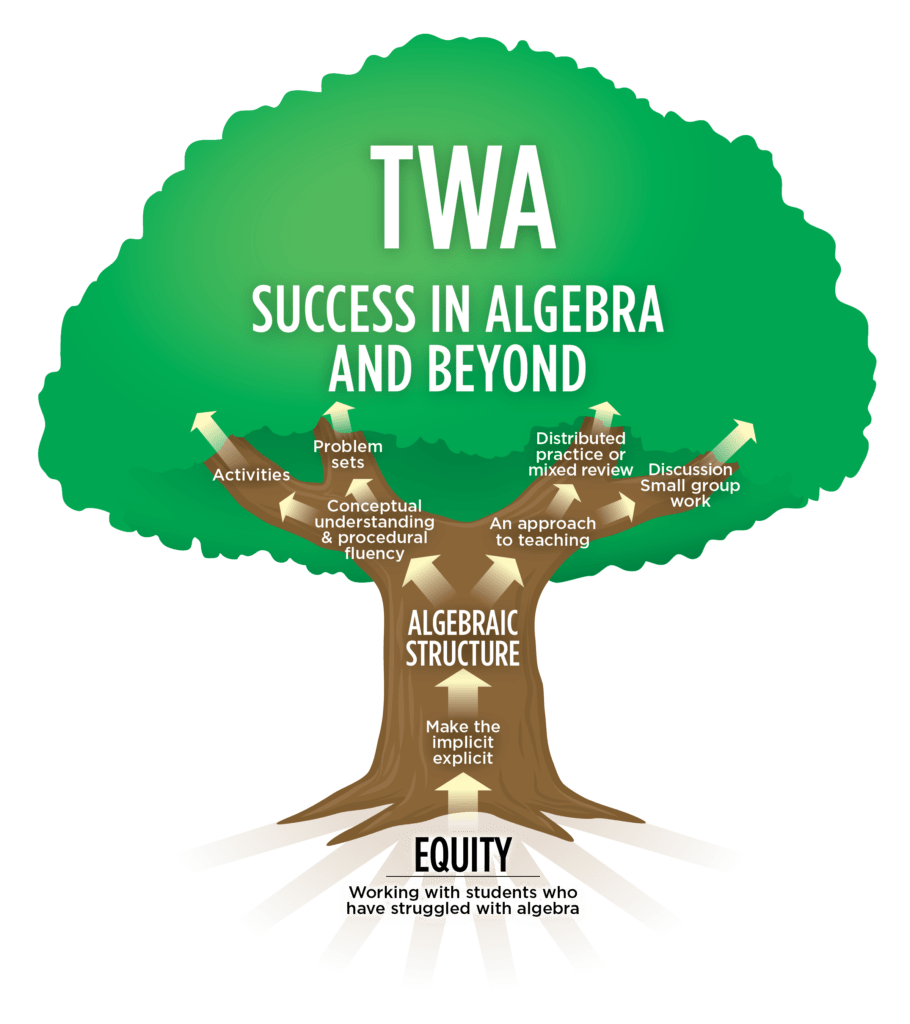About Thinking With Algebra
About Thinking With Algebra
What We Do
Thinking With Algebra (TWA) is a curriculum development project funded by the National Science Foundation (DUE: 2021414) to prepare undergraduate students conceptually and procedurally for introductory or intermediate algebra. Specifically, TWA consists of 30 lessons centered on the major topics of a first course in algebra which are theoretically and pragmatically grounded. The lessons consist of problem sets and whole-class, game-like activities.

What Makes Us Unique?
The Thinking With Algebra (TWA) curricular materials is unique primarily because of its focus on algebraic structure and how it is presented to instructors! The curriculum materials provide a lengthy discussion on the theoretical aspects of structure. A key point is that algebraic structure is often implicit, as experienced algebraist we often do not see the underlying structure which students do not see. Our goal is to make algebraic structure explicit to instructors and they in turn make it explicit to students. Each activity has notes where structure is frequently highlighted. These notes help instructors provide opportunities to learn algebra topics with consideration of algebraic structure. By making algebraic structure explicit, students have an opportunity to learn about algebra from a different perspective, particularly helping students who have struggled with algebra.
Explicit Algebraic Structure
Our goal is to make algebraic structure explicit to instructors and students. Each activity has notes where structure is frequently highlighted. These notes help instructors provide opportunities to learn algebra topics with consideration of algebraic structure.
Equity
In addition, the project takes the learner into consideration by focusing on how people learn algebra. The instructional materials are designed to be used for introductory algebra at universities and especially at community colleges.
Distributed Practice Approach
Distributed practice provides opportunities for enhanced learning as students reflect on algebra topics learned previously and make connections with their experience and other mathematical principles before new topics are introduced.
Advocates Whole-class Discussions
Small-group work and whole-class discussions provide opportunities for students to share different solution methods, learning from mistakes or misunderstandings, and consider the reasoning of other students.
Algebraic Structure
One of the major tenets of this project is a focus on ‘algebraic structure’ and making it explicit to both instructors and students. Algebraic structure is the processes, properties, procedures, and created symbolic generalizations which allow for the abstract manipulation of algebraic entities (generalized objects and processes expressed symbolically), which maintain algebra’s logical consistency. To operate meaningfully with algebra, the project strives to help students develop competence in six features of structure which we call ‘structure sense’.
Equity
In addition, the project takes the learner into consideration by focusing on how people learn algebra. The instructional materials are designed to be used for introductory algebra at universities and especially at community colleges. This student population has typically not been successful in algebra and the course material they typically experience is often a repeat of what they did in high school. The design of the materials and the suggested instructional approaches takes these factors into consideration. Algebra has been a gatekeeper to higher-level mathematics and in turn STEM degrees and professions.
Distributed Practice
TWA takes a distributed practice or mixed review approach to the teaching and learning of algebra, where topics are continuously revisited. This allows for multiple opportunities to revisit the topics if students do not initially make sense of the mathematics.
Pedagogical Approach
The project advocates small-group work and whole-class discussion as the recommended pedagogical approach. The role of discussion in the TWA project is one of the most important aspects of the project! Taking the perspective that learning occurs in the course of social interaction, we advocate requiring students to verbalize and justify their mathematical thinking which encourages a deeper understanding of mathematics.